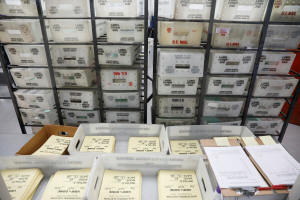Florida governor signs Republican-backed law imposing new voting curbs
 Send a link to a friend
Send a link to a friend
 [May 07, 2021]
By Julia Harte [May 07, 2021]
By Julia Harte
(Reuters) -Florida Governor Ron DeSantis on
Thursday signed a bill imposing new limits on voting by mail and using
ballot drop boxes, the latest Republican-backed voting restrictions to
become law in a U.S. election battleground state.
The new law restricts the use of absentee ballot drop boxes to the early
voting period, adds new identification requirements for requesting such
ballots, and requires voters to reapply for absentee ballots in each new
general election cycle. Previously, Florida voters only had to apply
once every two election cycles.
The law also gives partisan election observers more power to raise
objections and requires people offering voters assistance to stay at
least 150 feet (45 meters) away from polling places, an increase from
the previous 100-foot (30-meter) radius.

Republican legislators in dozens of states have pursued measures to
restrict voting rights in the aftermath of former President Donald
Trump's false claims that the 2020 election was stolen from him through
widespread voting fraud. Lawmakers in the Texas House of Representatives
were poised on Thursday to advance sweeping new voting limits despite
opposition from numerous businesses.
Minutes after DeSantis signed the law, the League of Women Voters of
Florida and two other civil rights groups sued Florida's 67 counties to
try to block the new restrictions. They are represented by Marc Elias, a
Democratic lawyer who also sued Georgia over voting limits the state
passed in March.
The Florida branch of the National Association for the Advancement of
Colored People (NAACP), Disability Rights Florida and the good
government group Common Cause also sued the state on Thursday, arguing
the limits would disproportionately hurt Black, Latino and disabled
voters.
Republican lawmakers have cited the unfounded claims made by Trump, a
Florida absentee voter himself, after his decisive loss to Democrat Joe
Biden.
Judges rejected such claims in more than 60 lawsuits that failed to
overturn the election result. Lawmakers in Republican-controlled states,
including Georgia, Texas and Arizona, nevertheless proposed legislation
they said was necessary to curb voter fraud, which is extremely rare in
the United States.
[to top of second column]
|

U.S. Postal Service trays with mail-in ballots are seen
during the 2020 U.S. presidential election in Miami,
Florida, U.S., November 3, 2020. REUTERS/Marco Bello

DeSantis acknowledged in February that Florida had
"held the smoothest, most successful election of any state in the
country," but said new limits on absentee ballots were needed to
safeguard election integrity.
DeSantis, who signed the law in an appearance on the Fox News
Channel show "Fox & Friends," said, "Me signing this bill here says,
'Florida, your vote counts, your vote is going to be cast with
integrity and transparency.'"
Mail-in ballots or absentee ballots were used by Democratic voters
in greater numbers than Republicans in the 2020 election, as many
people avoided in-person voting during the coronavirus pandemic.
Florida Republicans used mail-in voting slightly more than Democrats
in the 2014, 2016 and 2018 general elections. But in November,
Democrats submitted 2.2 million mail-in ballots compared with 1.5
million from Republicans, state records show, after Trump falsely
asserted for months that mail voting was rife with fraud.
In March, Georgia's Republican governor signed a law that tightened
absentee ballot identification requirements, restricted ballot
drop-box use and allowed a Republican-controlled state agency to
take over local voting operations.
Democrats and voting rights advocates sued Georgia over the measure,
saying it was aimed at disenfranchising Black voters, who helped
propel Biden to the presidency and deliver Democrats two U.S. Senate
victories in Georgia in January that gave them control of the
chamber. Top U.S. companies also decried Georgia's law, and Major
League Baseball moved its All-Star game out of the state in protest.

(Reporting by Julia Harte in Washington; additional reporting Joseph
Ax; Editing by Colleen Jenkins, Bernadette Baum and Jonathan Oatis)
[© 2021 Thomson Reuters. All rights
reserved.] Copyright 2021 Reuters. All rights reserved. This material may not be published,
broadcast, rewritten or redistributed.
Thompson Reuters is solely responsible for this content. |